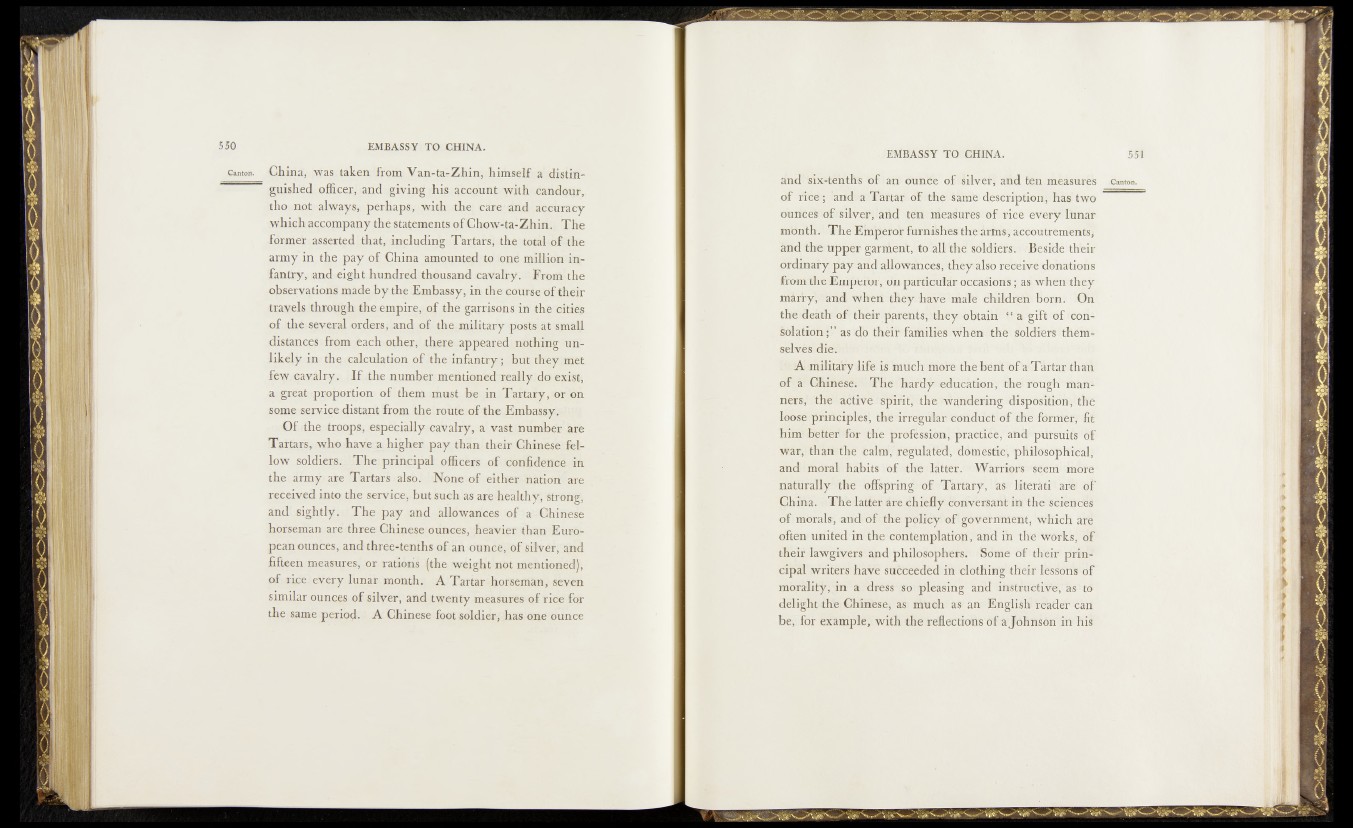
China, was taken from Van-tarZhin, himself a distinguished
officer, and giving his aecqunt. with candour,
tho not always, perhaps, with the care; and accuracy
wh ich accompany thé statements of Chow-ta-Zhin., The
-former asserted that, including Tartars) the total of the
army in the pay o f China amounted to one million infantry,
and eight hundred thousand cavalry. From the
observations made b y the Embassy, in the course Of their
travels through the empire, o f the garrisons in the cities
o f the several orders, and o f the military posts at small
distances from each other, there appeared nothing UH-
likdly in the calculation o f the infantry; but they, met
ieyc cavalry. I f .the number mentioned "really do exists
a great proportion o f them must be in Tartary, or on
some service distant from the route^fthe- |Embassy^#;! ’5
O f rthe troops, especially cavalry, a vast number: are
Tartars, who have a higher pay than their Chinese5 fe llow
soldiers. T h e principal officers o f confidence in
the army are Tartars also. None o f either-nation^are
received into the service, but such as areffiealthy, strong*
and sightly. T h e pay and allowances o f a Chinese
horseman are three Chinese ounces, heavier than lu S i^
pean ounces, and three-tenths o f an ouneépSf silver;' Slid
fifteen measures, or rations |the weight not mentioned'),
o f rice every lunar month. A Tartar horseman, seven
similar ounces o f silver, and twenty measures o f rice for
the same period. A Chinese foot soldier, ihas one ounce
and six-tenths o f >an aunde o fiiilv e r’ and tin , measures .Canton,
of rice -; ’arid1.a Tartar-of the safmfe-description, has two
ouneeS'of silver,’;arid teri ‘ tr'es"of vice every lunar
month. T h e E kJperorfurnishes theli^m's;’accoutrements;
and the; ripper garirierit,’ to all th e soldiers1.^ "Beside th’exr
ordinary pay arid allowances; theysil&o tebdiVe 'donations
fmriathe Empferbr, on particular occasionsa'sl When th e y
m&rfyv sand when -they; have1 male children.'’ b o rn . -On
thte deathrof ’their parents, they:obtain ‘5t*#gift of-fcori-
s o l a t i o n a s do their families when the- soldiers ithem^
selves; ;die;>it
/ A military-life is muoh’mOte’the bent Vf^Tirtar't'ha^
of a Ghiriesei' The hardy ed®scai<Son, the- feoU^ll"m'ali-
ners,1 n'fhe active $pfnSt) the -warrderingtdispositio'hdlh'e
loose principles) th e ir regular, conduetof tihe fdrriSer} fit
him- better- for the profession, practlle, arid»‘pidrS,#i®/'of
war,>than the calm, yegulated, domestic; ’phihJsopMeals
and moral habits of the latter. Warriors ^s^erif iiiofe
naturally the offspriiig!v?Of Tartary, ' as 'literati> are-5 of
China. Thfe lader dre chiefly convei^arit in t®?e»§ieh‘cfl3
«If* morals;, sand of the p o li^ fo f goverrfmeflfj^WMdb atfl
often united'in the contemplation, arid in the^rifk-s,’ of
their lawgivers and philosopher^5' Some of their principal
writers have succeeded in clothing th’eindbsJoris Of
morality, in a ' dress'so’.pleasing arid :iilstFtie!t*iv,e,"ks>to
delighethe Chlfflfese; as: mUch as’an Ikigli^¥%d^r?-tcMtt’
be, for example, With the reflections of a’Joh-n^onan h il
I I H H '